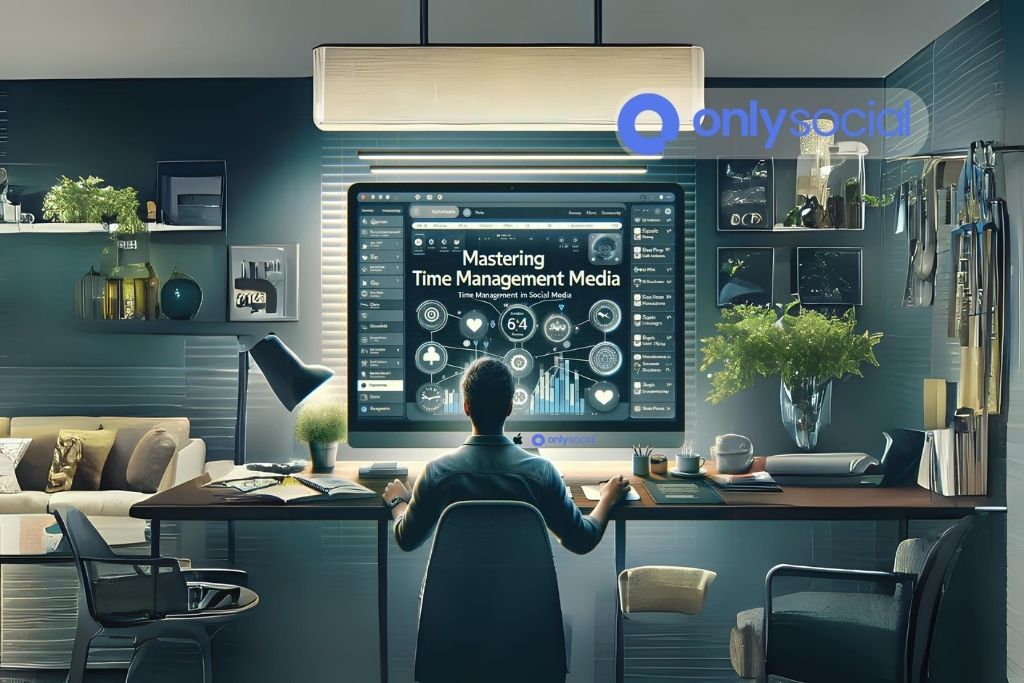In today’s digital age, social media has become an integral part of our daily lives. It’s a powerful tool for connecting with others, sharing information, and even marketing businesses. However, it’s easy to fall into the trap of spending too much time scrolling through feeds, watching videos, and interacting with content, often at the expense of productivity and personal well-being. This is where the concept of time management for social media comes into play.
Time management for social media involves implementing strategies and practices that help individuals and businesses use social platforms efficiently and effectively, without allowing it to consume their entire day. It’s about finding a balance between staying connected and maintaining productivity in other areas of life. For many, mastering this balance is crucial for mental health, work performance, and personal relationships.
In this guide, we will explore various techniques and tools that can help you manage your social media time more effectively. Whether you’re a social media professional looking to optimize your workflow, a student trying to balance social media use with studies, or someone simply looking to reduce screen time for a healthier lifestyle, this article will provide valuable insights into managing your digital time wisely.
Table of Contents
- 1 Understanding the Impact of Social Media on Time
- 2 Strategies for Effective Time Management on Social Media
- 2.0.1 Set Specific Goals for Social Media Use
- 2.0.2 Use Time-Limiting Features
- 2.0.3 Schedule Social Media Time
- 2.0.4 Turn Off Non-Essential Notifications
- 2.0.5 Prioritize Face-to-Face Interactions
- 2.0.6 Implement a ‘Digital Detox’
- 2.0.7 Use Productivity Apps
- 2.0.8 Reflect on Your Social Media Use
- 2.0.9 Educate Yourself on Mindful Use of Social Media
- 3 Time Management Tips for Different Social Media Platforms
- 4 Tools and Resources for Managing Social Media Time
- 5 Overcoming Challenges in Social Media Time Management
- 6 BONUS
- 7 Frequently Asked Questions
- 7.0.1 What is time management for social media?
- 7.0.2 How can I track the time I spend on social media?
- 7.0.3 What are some effective strategies for managing social media time?
- 7.0.4 Can taking breaks from social media improve my mental health?
- 7.0.5 How do I deal with social media addiction?
- 7.0.6 Is it beneficial to delete social media apps from my phone?
- 7.0.7 How can I use social media more productively?
- 7.0.8 What tools can help me limit my children’s social media use?
- 7.0.9 How often should I check social media?
- 7.0.10 Can social media time management improve my relationships?
Understanding the Impact of Social Media on Time
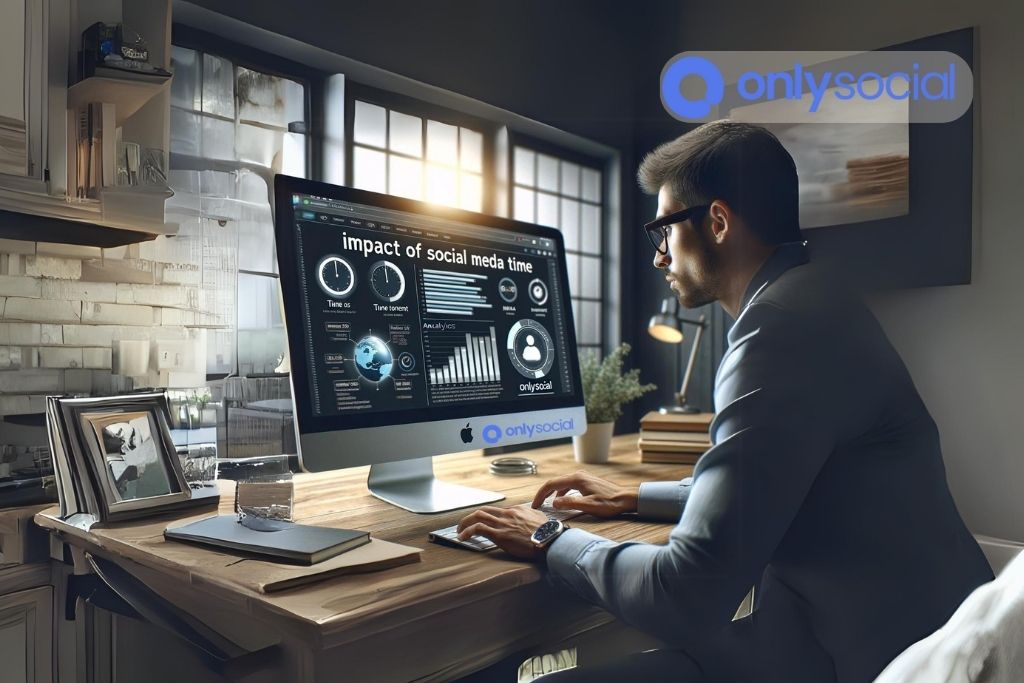
In today’s digital age, social media platforms have become an integral part of our daily lives. While they offer numerous benefits, such as staying connected with friends and family, enhancing business visibility, and providing a platform for self-expression, managing the time we spend on these platforms can be challenging. The concept of time management for social media is crucial to ensuring that our engagement with these digital platforms does not adversely affect our productivity, mental health, and personal relationships.
The Allure of Social Media
Social media platforms are designed to be addictive. The endless scroll of content, notifications, likes, and comments can keep users engaged for hours on end. This design taps into the human desire for social interaction and validation, making it difficult to log off even when we are aware of the time being spent.
The Impact on Productivity
Excessive use of social media can significantly impact productivity. Time that could be spent on work, studies, or pursuing hobbies often gets consumed by scrolling through social media feeds. This diversion not only affects the quality and quantity of work produced but also hampers creativity and the ability to concentrate on tasks that require deep focus.
Effects on Mental Health
There is a growing body of research linking excessive social media use to negative mental health outcomes. These include anxiety, depression, and feelings of inadequacy, stemming from constant comparison with others, cyberbullying, and the pressure to maintain a certain online persona. Time management for social media is vital in mitigating these effects and fostering a healthier relationship with digital platforms.
Social Relationships and Real-life Interaction
While social media provides a convenient way to keep in touch, it can also detract from face-to-face interactions and meaningful connections. The time spent on screens can replace the time that could be spent nurturing real-life relationships. Understanding and managing how much time we dedicate to social media is essential in maintaining a balance between our online and offline lives.
Strategies for Effective Time Management on Social Media
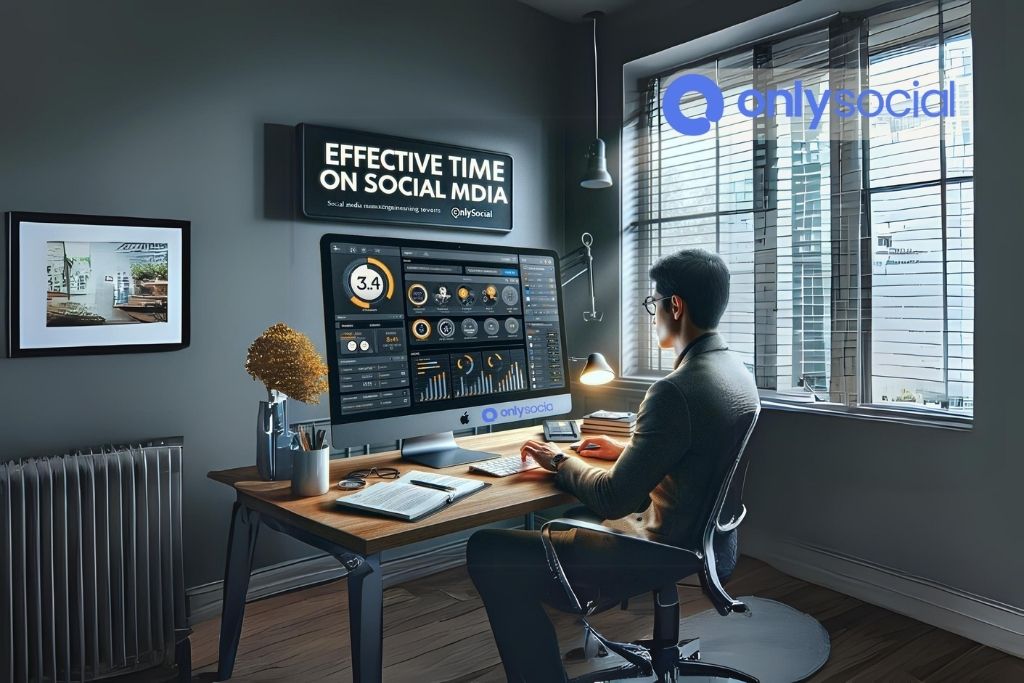
Managing the time we spend on social media is essential for maintaining productivity, enhancing our well-being, and ensuring that our digital habits support our real-life goals and relationships. Here are several strategies to help foster effective time management for social media:
Set Specific Goals for Social Media Use
Begin by defining clear objectives for your social media usage. Are you using it for business, education, staying in touch with friends, or entertainment? Setting specific goals can help you focus your time on social media, making your interactions more purposeful and time-efficient.
Use Time-Limiting Features
Most smartphones and social media platforms now offer tools that allow you to monitor and limit your usage. Setting daily time limits for each app can prevent excessive scrolling and help you become more conscious of the time you spend online.
Schedule Social Media Time
Designate specific times of the day for social media and stick to this schedule. By allocating certain periods for checking and engaging on these platforms, you can avoid the temptation to constantly check for updates throughout the day.
Turn Off Non-Essential Notifications
Notifications are a significant distraction that can lead to unplanned time on social media. By turning off non-essential alerts, you can reduce interruptions and the urge to immediately check your phone, allowing you to concentrate on more important tasks.
Prioritize Face-to-Face Interactions
Make a conscious effort to prioritize in-person interactions over digital ones. Spending quality time with friends and family without the interference of smartphones and social media can help strengthen relationships and improve your overall happiness and well-being.
Implement a ‘Digital Detox’
Consider taking regular breaks from social media, whether it’s for a day each week or a longer period. A digital detox can help reset your relationship with social media, reducing dependency and improving your ability to manage time effectively on these platforms.
Use Productivity Apps
There are numerous apps designed to boost productivity by blocking access to social media during work hours or when you need to focus on specific tasks. Utilizing these tools can help you avoid distractions and manage your time more efficiently.
Reflect on Your Social Media Use
Regularly review how much time you’re spending on social media and assess whether this aligns with your goals and priorities. Reflection can motivate adjustments to your social media habits, leading to more effective time management.
Educate Yourself on Mindful Use of Social Media
Educating yourself about the impact of social media and learning about mindful usage can empower you to make informed decisions about how and when you engage with these platforms.
Time Management Tips for Different Social Media Platforms
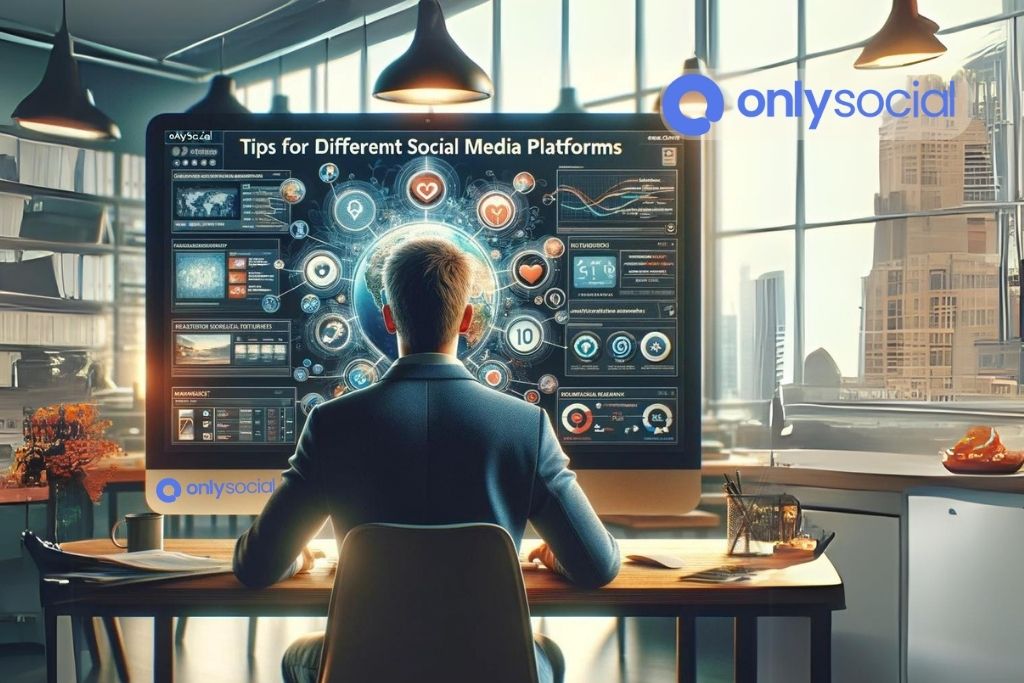
Effective time management for social media involves adopting platform-specific strategies that cater to the unique features and user experiences of each social media site. By understanding the nuances of each platform, users can optimize their time spent online, ensuring a balanced and productive engagement. Below are tailored time management tips for some of the most popular social media platforms.
- Set Specific Times for Checking Updates: Limit your Facebook use by scheduling specific times during the day for checking updates, rather than scrolling intermittently.
- Use the ‘Save for Later’ Feature: Instead of spending time reading through articles or watching videos immediately save them to your ‘Saved’ list to view at a more convenient time.
- Prioritize Important Connections: Customize your news feed to prioritize posts from close friends and family, reducing the time spent on less relevant content.
- Curate Your Feed with Lists: Organize accounts you follow into lists based on topics or relationships. This allows for targeted reading, saving time by focusing on updates that matter most to you.
- Limit Time Spent on Trending Topics: While it’s tempting to get lost in the endless stream of trending topics, set a timer to limit your engagement, ensuring you allocate time wisely.
- Utilize Scheduling Tools: For content creators, using scheduling tools can help manage your presence efficiently, allowing for bulk planning and posting.
- Set Time Limits for Usage: Use Instagram’s built-in activity dashboard to monitor your daily usage and set reminders to take breaks.
- Engage with Purpose: Focus on engaging meaningfully with posts that align with your interests or relationships, rather than aimlessly scrolling through the feed or Explore page.
- Organize with Saved Collections: Save posts you’re interested in into categorized collections for easy access later, reducing time spent searching for them again.
- Allocate Time for Networking and Learning: Divide your LinkedIn time between networking activities (like connecting with new professionals and participating in groups) and learning (such as reading articles or taking courses).
- Use Filters for Efficient Job Searching: If job searching, utilize filters to narrow down results, saving time by applying only to those positions that meet your specific criteria.
- Prioritize Engagements: Focus your time on engaging with content and connections that are most relevant to your professional growth and objectives.
TikTok
- Be Mindful of the Scroll: TikTok’s endless scroll can quickly consume hours. Be conscious of the time spent and consider setting a timer to limit your usage.
- Curate Your For You Page: Actively like, share, or skip content to teach the algorithm to show more of what you find valuable, reducing time spent on irrelevant content.
Tools and Resources for Managing Social Media Time
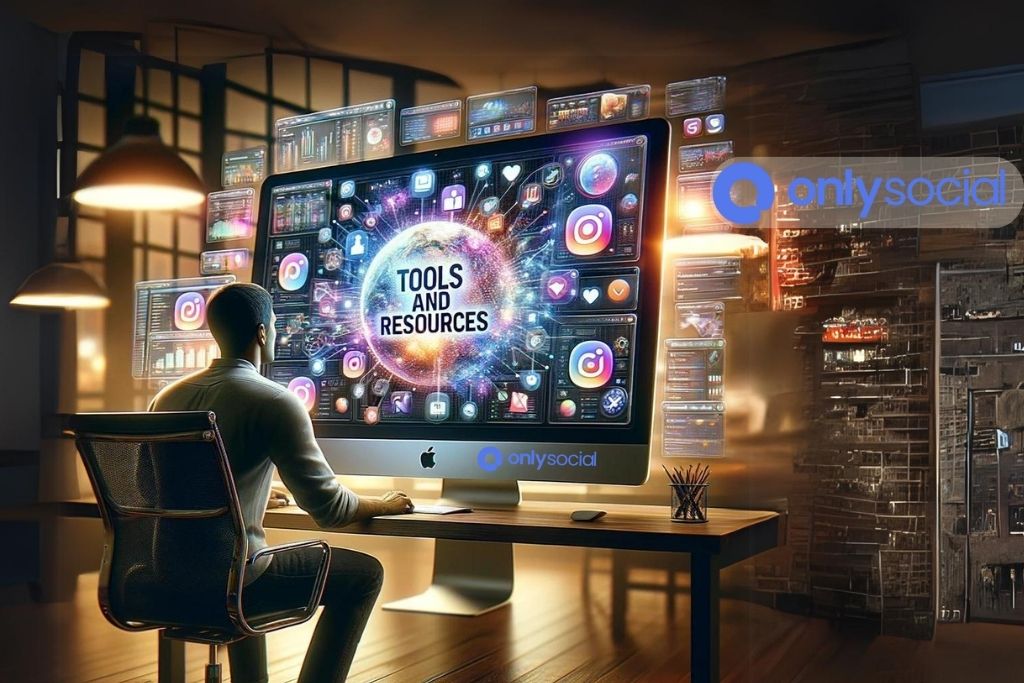
Effective time management for social media often requires external tools and resources to help monitor and limit time spent on various platforms. These tools can provide insights into usage patterns, set limits, and even block access to platforms during designated times to improve productivity and well-being. Here are some notable tools and resources, including Onlysocial, designed to assist in managing social media time more effectively.
Onlysocial
- Description: Onlysocial is a comprehensive tool designed to help users manage their social media usage more effectively. It offers features such as usage tracking, setting daily limits, and scheduling specific times for social media access to prevent overuse.
- Benefits: By providing detailed insights into your social media habits, Onlysocial helps identify areas where you might be spending too much time, allowing for targeted adjustments to your daily routine.
StayFocusd
- Description: StayFocusd is a browser extension that limits the amount of time you can spend on time-wasting websites, including social media platforms. Once your allotted time has been used up, the sites you have blocked will be inaccessible for the rest of the day.
- Benefits: It’s highly customizable, allowing users to specify which sites to block, for how long, and even which times of day or days of the week to enforce these limitations.
Forest
- Description: Forest is an app that encourages users to stay focused on tasks outside of social media. When you want to focus, you plant a virtual tree. If you succeed in not using your phone for a set period, the tree grows; if you fail, the tree dies.
- Benefits: This gamified approach provides a visual and rewarding way to manage time and reduce social media use, encouraging productivity in a unique and engaging manner.
Screen Time (iOS) and Digital Wellbeing (Android)
- Description: Both iOS and Android devices come with built-in features—Screen Time for iOS and Digital Wellbeing for Android—that track your device usage, including time spent on social media apps. They offer tools to set limits for apps, schedule downtime, and provide detailed reports of your daily and weekly usage.
- Benefits: Being built into the phone’s operating system, these tools offer a convenient and seamless way to manage social media use without the need for additional downloads or services.
Freedom
- Description: Freedom is an app that blocks distracting websites and apps across all your devices. You can schedule focused sessions, during which selected social media platforms will be inaccessible, to ensure you remain productive.
- Benefits: Freedom helps to eliminate distractions across your computer, phone, and tablet by synchronizing blocks, making it an effective tool for those who work on multiple devices.
Overcoming Challenges in Social Media Time Management
Effective time management for social media is essential in today’s digital world, where the boundary between online presence and real-life obligations often blurs. However, managing social media time is fraught with challenges, ranging from habitual scrolling to the fear of missing out (FOMO). Here are strategies to overcome these obstacles and maintain a healthy balance between social media use and daily life.
Recognizing and Addressing Habitual Use
- Awareness: The first step in overcoming the challenge of habitual use is recognizing your patterns. Track how often you check social media and what triggers this behavior.
- Replacement Activities: Find alternative activities to fill the time you would typically spend on social media. Engaging in hobbies, exercising, or spending time with friends and family can provide more fulfilling experiences.
Dealing with FOMO
- Rationalizing the Experience: Understand that social media is a highlights reel, not an accurate representation of everyday life. Remind yourself that missing out on certain content online is okay and that real-life experiences are more rewarding.
- Curate Your Feed: Follow accounts that add value to your life and unfollow or mute those that trigger feelings of inadequacy or anxiety. This can help minimize the impact of FOMO.
Setting Boundaries
- Designated No-Social Media Times: Establish specific times of the day or particular settings (such as during meals or before bedtime) where social media is off-limits. This helps in creating a routine that prioritizes meaningful activities over online scrolling.
- Use of Time Management Tools: Utilize tools and apps specifically designed to limit social media use. These can help enforce the boundaries you set for yourself, making it easier to stick to your goals.
Managing Notifications
- Turning Off Non-Essential Notifications: One of the biggest distractions comes from constant notifications. By turning off non-essential alerts, you reduce the temptation to check your phone impulsively.
- Scheduled Check-ins: Instead of responding to notifications as they come, schedule specific times to check social media. This consolidates your social media activity into manageable chunks, reducing disruption to your day.
Developing a Mindful Approach
- Intentional Usage: Be mindful of why you’re logging onto social media. Is it for relaxation, to connect with others, or to consume content? Understanding your intentions can help you use social media more purposefully and satisfactorily.
- Quality Over Quantity: Focus on engaging deeply with fewer posts or people rather than superficially scrolling through a vast amount of content. This ensures the time spent on social media is meaningful and enriching.
BONUS
Frequently Asked Questions
What is time management for social media?
Time management for social media refers to the practice of consciously controlling the amount of time spent on social media platforms to ensure it does not interfere with productivity, personal relationships, and overall well-being.
How can I track the time I spend on social media?
Most smartphones come with built-in tools like Screen Time for iOS and Digital Wellbeing for Android that track app usage. Additionally, third-party apps like Onlysocial and RescueTime offer detailed insights and management features for social media use.
What are some effective strategies for managing social media time?
Effective strategies include setting specific times for social media use, using timer apps to limit sessions, disabling notifications to reduce distractions, and prioritizing tasks before checking social media.
Can taking breaks from social media improve my mental health?
Yes, taking breaks from social media can significantly improve mental health by reducing feelings of anxiety, depression, and loneliness associated with excessive use. It allows for more time to engage in real-life interactions and activities that promote well-being.
How do I deal with social media addiction?
Dealing with social media addiction involves recognizing the problem, gradually reducing screen time, seeking alternative activities that provide fulfillment, and potentially seeking professional help for underlying issues driving the addiction.
Is it beneficial to delete social media apps from my phone?
Deleting social media apps can be beneficial for those who find it difficult to resist the temptation to constantly check updates. It creates a physical barrier to access, helping to reduce usage and encourage engagement in other activities.
How can I use social media more productively?
Using social media productively involves curating your feed to align with your interests or professional goals, engaging with content that adds value, and utilizing social media for learning and networking instead of passive scrolling.
What tools can help me limit my children’s social media use?
Parental control apps like Qustodio and Net Nanny offer features to monitor and limit children’s social media use. Setting clear rules and having open discussions about responsible social media use are also key strategies.
How often should I check social media?
The frequency of social media checks should depend on personal goals and responsibilities. It’s recommended to designate specific times for checking social media, such as during breaks or designated leisure times, to avoid constant distractions throughout the day.
Can social media time management improve my relationships?
Yes, effective time management for social media can improve relationships by freeing up more time for face-to-face interactions and reducing the negative impact of excessive social media use on communication and emotional availability.

